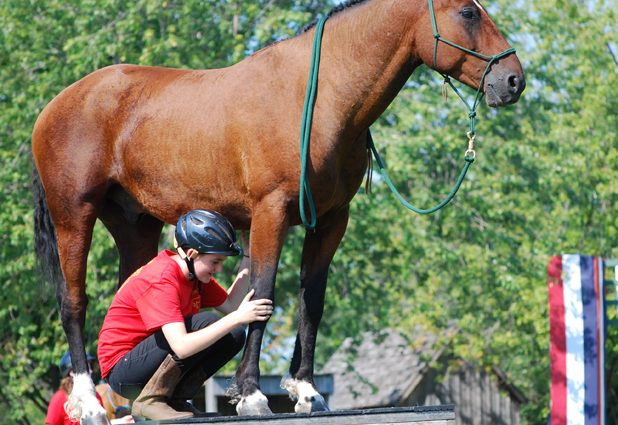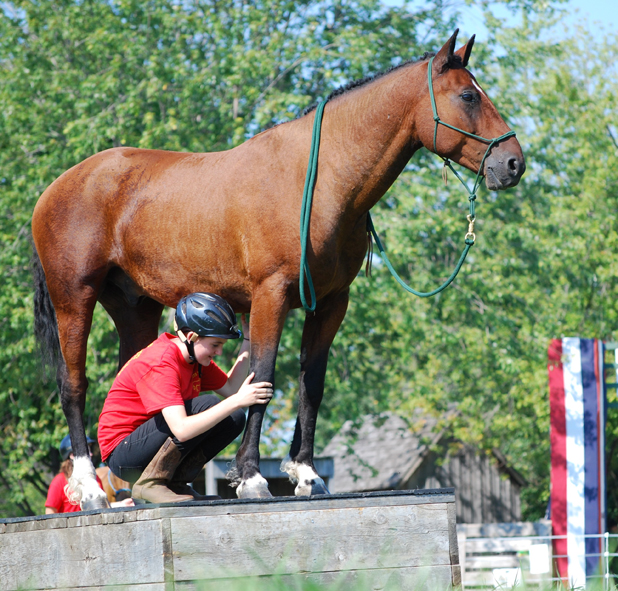CFN – This Column of “Spirits in Unity” is being published by CFN for the community of Stormont, Dundas & Glengarry.
Think Like a Horse
Even though we predators feel fear, unlike horses we tend to push through the fear or ignore it in order to win at all costs. Our motivation for praise, recognition and material things often overrides our common sense.
We may get away with that attitude around predators like ourselves, but around horses the traits that may work for you in your predator world will get you into trouble with these prey animals. High achieving humans find out the hard way that when you try to push a horse against his will, it evokes fear in him and the consequences can be harsh.
If you want to have success with horses you have to train yourself to think, act and feel like a horse. The more you can understand how a horse thinks and why he does the things he does, the better you will get on with him.
You will hear people with horses say all the time that they do what they do because they are going to win the battle. Personally, I don’t want to have a battle with an animal that has the potential of hurting me severely or even killing me. Instead of tension and struggle I would rather develop more harmony so he will become a willing partner with me.
When your horse trusts you, he’s calmer. When he likes you, he’s more forgiving. Just the other day a new student of mine was playing with her horse and had him standing on a pedestal. We were talking about the danger zones around a horse when I ducked down and passed from one side of her horse to the other under his belly, her eyes bugged out. I asked her if that was one of the danger zones she had been taught about. She responded, “Yes”. But she had her horse trusting and calm so even though there is always the possibly of risk, I was in little danger because of her actions with her horse.
Thinking like a horse and developing a trust-bond relationship adds up to greater safety, a better relationship and more confidence.
Override Your Predatory Instincts
A horse’s survival instincts are completely the opposite of yours and so we have to override our predator born instincts. Predators grab, horses run away. Predators reason, horse react. People are motivated by praise, recognition and material things. Horse are motivated by safety, comfort, play and food in that order. Until they feel safe, they don’t care about comfort. And until they feel safe and confident, they won’t play or be motivated by treats.
We humans think our horses love to be hugged and kissed. We think that saying, “Easy boy, easy boy” when our horse is upset will calm him down. We think we can lure a horse into a trailer with treats. We are surprised when the horse we give so much love to hurts us, or won’t do what we want him to do or won’t let us catch him. We tend to think that we don’t deserve such behavior because we are transferring human thoughts and reasoning into our horse. He does not think anything like us and what motivates us is not what motivates him.
I recently received a horse publication which posted the winning photos in a horse photo contest. The winning photo was a shot of a very young child standing directly in front of a rather large horse with his head lowered and she is kissing him on the nose. I have seen this shot so many times and we all think, “Oh, that is so cute”. To have my students think twice about kissing their horse on the muzzle, I have them take an apple and hold it next to his lips and see what happens to the apple. Get the picture? It’s treating the horse like he has human values. He does not. And I shudder each time I see that shot, because I know how badly it can turn out for the child.
Knowledge is Confidence
The more we learn about horse psychology, the less we are surprised and the more confident we are. We have to learn how to understand our horses both as a species and as an individual.
One of the best rules to follow with horses when you are unsure about what you should do is to do the exact opposite of what your instincts are telling you. Reverse psychology works wonderfully well with horses.
How to Do The Opposite
Pat Parelli wrote somewhere ten or so tips for how to apply reverse psychology.
1. Just when you want to do more, Quit
2. Just when you want to approach, Retreat.
3. Just when you want to smack him, Rub Him.
4. Just when you want to blame him, Think About What Your Are Doing Wrong
5. Just when he does the opposite of what you expected, say “How Interesting”.
6. Just when you think there is no solution, Dig Deeper.
7. Just when you think you know it all, Learn More.
8. Just when you think you are sure, Don’t be So Sure.
9. Just when you want to give up, Hang In There.
10. Just when you want to stay on, Get Off.
Number 10 will be the topic for next week’s column. “Get Off Me, You Idiot!”
Be sure to click on the ‘like’ or ‘dislike’ buttons to let us know that you have read today’s column. It is an honor to have you as a reader. I welcome any comments, questions or topics you would like me to discuss. I hope you enjoy reading about the wonderful world of horses and the impact that natural horsemanship can have in making it a better world for both horses and humans.
In our ‘Spirits in Unity’ program we believe in developing a trusting relationship and a true partnership with a horse before even thinking about getting on his back. He probably prefers it that way too.
Whether you are just a horse lover, have dreams of owning a horse someday, or already have one, I hope these columns will give you some insight into the true nature of these magnificent creatures. I hope you will find them both informative and inspirational.
On Oct. 7 The Young Horse Whisperers and some special horses will be participating in Nature and Wildlife Day at the Upper Canada Migratory Bird Sanctuary. This will be our last “Spirits in Unity” tour stop for 2012. We hope you will come and visit us at this fundraiser for the Friends of the Sanctuary. You can check out the event at http://friendsofthesanctuary.org
Until next time…
May all your dreams come true,
Garry “Horsetalker” Meek



Hi Garry,
Great column!
Recently I read that some famous trainer,,forget who, had his young daughter facing his horse and he bit her in the face and tore skin etc,,,she needed hospital,care…..
Definitely a “NO-NO”
Denyse
Thanks for the comment. I’ve heard also of such things occurring but I have not been able to document. Makes you think twice though doesn’t it.